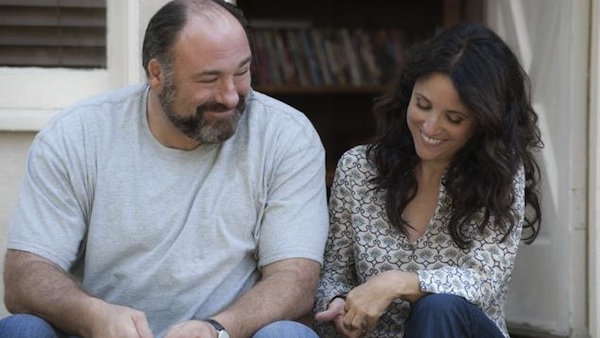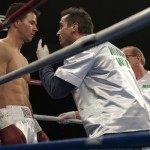Enough Said Review
Considering my only taste of writer/director Nicole Holofcener‘s cinema was the icy cold Please Give, it’s hard for me—even in its wake—to think of her as the heart and soul behind Enough Said. Maybe that’s because the true heart and soul of the film is the late James Gandolfini, who gives one of his very best performances as an ordinary, divorced middle-aged man trying his hand at love once again.
And saying that isn’t meant to take away from Holofcener’s accomplishments; her screenplay, while occasionally uneven, injects great life into a contrived premise. Nor should it take away from what Julia Louis-Dreyfus does as the film’s lead and Gandolfini’s romantic partner. But weeks, months, and years later, if and when my thoughts turn toward Enough Said, they’ll be fond memories of an actor who left us at the top of his game.
Louis-Dreyfus plays Eva, a divorced mother of one who works as a masseuse in Southern California. At a party, she meets two people: a potential new client in Marianne (Catherine Keener) and a potential new boyfriend in Albert (Gandolfini). Well, “potential new boyfriend” is a bit of a stretch. She thinks he’s nice, but chubby and not particularly attractive. She goes out on a date with him anyway, and they have a hell of a time riffing on each other’s middle-agedness and marital problems.
They continue to see each other, and Eva develops a pretty friendly relationship with Marianne, too. She vents about her dreadful ex-husband, and Eva sympathizes. But it doesn’t take long before she realizes Marianne’s ex-husband is Albert. Gulp. It’s an incredibly awkward predicament that she keeps to herself. She’s not 100% sure about this guy, and Marianne’s warnings, as Eva describes, are like Trip Advisor—why stay in a hotel when someone else who’s stayed there describes it as awful. But as you’d expect, both this big secret and Marianne’s poisonous opinions are doing great damage. Is Eva’s diminishing interest in this nice guy simply a self-fulfilling prophecy?
The premise is a clever one, but it does wear thin rather quickly. Though just 93 minutes, Enough Said feels longer, and the more it goes back to the well that is Marianne complaining to Eva about Albert, the more long in the tooth it feels. It’s the same premise, though, that gives the film depth. It speaks universally toward human imperfection and the unpredictability of love. What drives one woman toward seeking a divorce is small potatoes to another, and Holofcener is careful not to cast aversion toward either point of view. Who’s to say whether Albert is an impossible husband or a perfect partner? It’s an entirely subjective proposition, and the point is extremely well-made here.
It’s an entirely moot point, however, if not for three terrific performances at the heart of Enough Said. Gandolfini’s is both the best and most essential. We need to see Albert’s heart (we do in abundance), as well as some of his more irritating traits if we’re to believe Eva is truly torn and therefore unable or unwilling to reveal the nature of her predicament—one that she knows will hurt all parties involved if and when it’s revealed. Gandolfini’s easy-going charm and mild irksomeness make the whole thing work, and it helps that he seems to be having a ball. His smile is infectious.
Ditto Louis-Dreyfus. Arguably the comedienne of a generation, she’s not one for movies for whatever reason; Enough Said represents her first live-action movie role since 1997 (Woody Allen’s Deconstructing Harry). But she lights up the screen here in a role tailor-made for someone with her wit and timing.
Keener is the third corner of this triangle, and she’s the weakest of the three, but it’s more a problem with the role being underdeveloped than any choices Kenner makes as an actress. Able supporting work is offered by Toni Collette (as Eva’s best friend), Tracey Fairaway (as Eva’s daughter, Ellen, who’s about to move to college), and particularly Tavi Gevinson. She plays Chloe, Ellen’s best friend, who comes from a complicated family situation. She’s not moving away to college like Ellen is, so Eva—as a sort of coping mechanism—becomes very close to Chloe. They spend time together without Ellen around. It’s a rather lovely subplot anchored by this puzzlingly good performance from the young actress. If only it was afforded a modicum of closure…
Nevertheless, Enough Said is a lovely film in the vein of The Kids Are All Right or Ruby Sparks. It’s high-concept, and said concept is only partially successful. But its endearing nature and sparkling performances help it sail through narrative rough patches and make it an easy film to both like and recommend.

















One Response to Enough Said Review